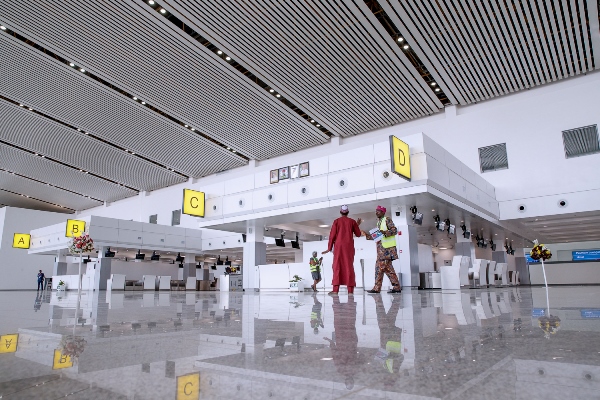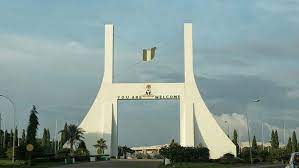
Tanko Mohammed
The current economic pressures, the quest for efficiency and profit generation have formed Nigeria’s decision to manage its commercial airports through a Public Private Partnership (PPP) arrangement, referred to as concession.
The plan to concession the airports and divest their management from the state-owned Federal Airports Authority of Nigeria (FAAN) is also borne out of the concern in ensuring that the commercial airports are self-sustaining, commercial, create more jobs and attract local industries.
The country currently has 31 airports out of which 26 are operated by the Federal Airports Authority of Nigeria (FAAN), five of which are functional international airports.
The international airports are located in Lagos, Abuja, Kano, Port Harcourt and Enugu.
Aviation Minister Hadi Sirika says the federal government has decided to give out terminal building, toll gates and non-eronotic areas to private operators inside one public-private enterprise arrangement.
He said that foreign investors were also free to take part in the planned concession of the nation’s four major international airports which have been picked for pilot test.
The four airports put up for concession are the Nnamdi Azikiwe International Airport, Abuja; Murtala Muhammed Airport, Lagos; Aminu Kano International Airport, Kano; and Port Harcourt international airport.
He said: “The Nigerian aviation sector is full of opportunities, some of which include the concession of airports (Abuja, Kano, Lagos and Port Harcourt); partnerships to establish a national carrier; maintenance, repair and overhaul centre; aviation leasing centre; and development of agro-cargo terminals and associated infrastructure.
“Others are partnerships to upgrade the Nigerian College of Aviation Technology; leisure and hospitality, including hotels and resorts; logistics facilitation, including taxi and car hire; cargo, courier, warehousing, clearing and forwarding; catering and packaging; currency exchange, duty free and tourism guide; and facility management.”
Sirika, however, that despite the opportunities there were numerous challenges which included difficulty in foreign exchange remittance, cost and availability of aviation fuel, high cost of aircraft maintenance, shortage of manpower and dilapidated infrastructure.
The minister on December 13, 2020 received the “Outline Business Case Certificate of Compliance for the concession’’.
Nigeria’s Infrastructure Concession Regulatory Commission (ICRC) has also released a document which the Federal Ministry of Aviation (FMOA) will adopt in considering Public-Private Partnerships (PPP) procurement methodology.
The Ministry of Aviation explained that the PPP is a strategy to leverage private sector participation and investment to achieve the upgrade and development of new terminal infrastructure at the four identified airports in a cost-effective and value for money based manner.
The document reveals that the airport terminal concession is one of the critical projects under the Aviation Sector Roadmap of Nigeria and fits well within the scope of the Ministry’s strategic plan for the sector.
In spite of the advantages in the plan as postulated by the government, the Nigeria Labour Congress (NLC), has led a coalition of aviation workers unions to protest against airport concession.
The unions are National Union of Air Transport Employees (NUATE), Air Transport Services Senior Staff Association of Nigeria (ATSSSAN) and Association of Nigeria Aviation Professional (ANAP), to protest against airport concession.
The unions alleged that the minister had usurped the responsibilities of FAAN in the concession, adding that the ICRC should have statutory deal with the airport agency, rather than with individuals.
NLC President, Mr Ayuba Wabba, argued that the organised labour condemned the plans by government to concession Nigeria’s major airports.
“It is with great alarm that we learnt of the renewed efforts by the Federal Government to concession the major airports.
“Nigerians may recall that the current concession drive of the present government did not start today. It has been part of the neo-liberal predilection of successive governments in Nigeria.
“It stretched from the military era up till the current democratic dispensation to deregulate, concession, and privatise critical national assets to their cronies and friends,” Wabba added.
The Deputy General Secretary of ATSSAN, Mr Francis Akinjole, said it was regrettable that FAAN had nothing to do with any project identification, prioritisation, or concept note to the ICRC, as required by the ICRC’s protocols.
“The only role FAAN has played so far is that of a representative member on the Project Delivery Team (PDT) and the Steering Committee as appointed by the Minister. Therefore, the ICRC and the Ministry, by carrying on with the airports’ concession project outside the purview of FAAN, is indicative of an unwholesome agenda.’’
The union argued that such action is unlawful as it contravenes Part II, 3(g) of the FAAN Establishment Act, 2004 as well as the Civil Aviation Act, 2005.
The unions say that the government, which benefitted from Chinese loans to provide for infrastructure improvements, is virtually begging the opposition to let a privatisation procedure go ahead.
What is more – they are promising to add other airports to such a scheme beyond the ‘big four’. But the opposition really wants to privatise those loss-makers first, as if being a loss-maker is attractive to an investor.
The Chairman of Air Transport Service Senior Staff Association of Nigeria (ATSSSAN), in Kano, Mr Hassan Aliyu, on December 17, 2020 insisted that the concession plan would cause job cut and put the future of retirees in jeopardy.
Mr Ahmed Yusuf, Chairman of National Union of Air Transport Employees (NUATE), said the issuance of the certificate for the concession came as a surprise and an insincere act.
“It lacked transparency and the members of staff are not carried along. We totally reject the concession because it is not transparent.
“If the four viable airports are privatised, the remaining airports will die because these four airports sustain the other airports. It is a disaster waiting to happen and definitely jobs will be lost.’’
But some stakeholders hold a different opinion, with many supporting government’s argument that the concession would lead to increase in operational efficiency, as well as create new paid incentives for management and employees.
They say right models for the airports concession to address infrastructure gaps in the nation would skilfully boost national economy, ICRC Director General, Mr Chidi Izuwah, said.
He said: “Besides, that will turn the airport terminals to its full potential in private hands as millions of dollars will be pumped into the airports.’’
He said the effort was to achieve the upgrade and development of new terminal infrastructure at the four airports in a cost-effective and value -for- money manner.
Izuwah emphasised the need for infrastructure investments and modernisation (runway maintenance, navigation aids as well as terminal facilities).
“President Muhammadu Buhari who approved the Aviation Sector Roadmap and a part of the terminal concession, said that the full implementation of the programme will create about 241,700 jobs.
Nigerians are keeping a date with the privatisation which will take effect in 2021.














